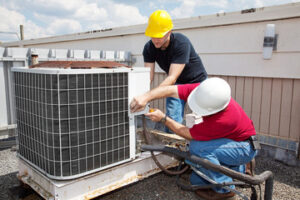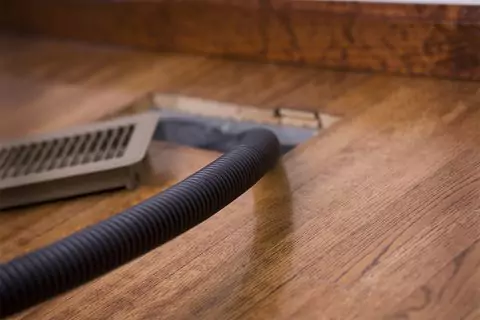HVAC systems are the networks that move air around your house or building, heating it in winter and cooling it in summer. Comfort Pro’s Heat and Air also filters and cleans indoor air to keep it healthy by removing dust particles, spores, mold, bacteria, and viruses.

These systems can be centralized or local, depending on where their primary equipment is located. Their main purpose is to achieve thermal comfort in a space.
Having an HVAC system that has been upgraded to the latest technology is not just good for your comfort, but it’s also great for the environment. New units are more energy-efficient than older models and use eco-friendly refrigerants, which can help reduce your carbon footprint.
A modern HVAC system is designed to offer improved comfort in homes by enhancing airflow, controlling temperature, and reducing humidity. It can even regulate the temperature of different rooms, making it easier to keep everyone in the house comfortable.
In addition to providing improved comfort, an upgrade will increase your home’s resale value. Buyers will likely purchase your home with an updated, highly energy-efficient heating and cooling system.
Modern HVAC systems prioritize energy efficiency, which can result in significant savings on your monthly utility bills. Older units are more wasteful, using more energy to deliver the same comfort level. If your team is more than ten years old, you may be wasting over 20% of the energy it consumes.
A properly functioning HVAC system will help to keep your indoor environment at a comfortable, stable temperature, regardless of the outdoor weather conditions. It will also help improve your home’s air quality by removing pollutants and allergens, which is important for anyone with respiratory problems or allergies.
The optimal placement of HVAC systems can also enhance energy efficiency and improve indoor air quality. Positioning the systems away from living areas minimizes noise disturbances, and they can operate more efficiently.
Optimizing thermal comfort in commercial buildings can increase worker productivity and create a healthier workspace. Studies have shown that when occupants are dissatisfied with the temperature or airflow in their workspace, it can cause them to become distracted and less productive.
Modern HVAC systems are designed with advanced air filtration capabilities, which can remove allergens and contaminants from the air. These filters can be especially helpful for families with children or pets, as they prevent these harmful particles from circulating throughout the home.
With today’s rising energy costs, there is a great emphasis on optimizing HVAC systems for energy efficiency. A new, high-efficiency system will save you money in the long run and help reduce your carbon footprint.
Older HVAC units require much more energy than new, high-efficiency models. That is because the older equipment has lower SEER (Seasonal Energy Efficiency Ratio) ratings, which means they consume more power to operate. Upgrading to a newer, more efficient system can drastically decrease energy consumption and monthly utility bills.
In addition to saving on energy bills, installing an efficient HVAC system can add value to your property. Homebuyers look for energy-saving features when buying a house and installing a new system can make your home more attractive to potential buyers.
Aside from reducing energy costs, a high-efficiency HVAC system can improve indoor air quality. Many modern HVAC systems come paired with state-of-the-art filtration and air purification technology that can eliminate many harmful contaminants in your indoor air. These can range from dust, pollen, and dander to mold, germs, and odors.
The best way to improve your system’s energy efficiency is to install a programmable thermostat and utilize zoning options in your home or office. That will ensure that only the rooms you use get heated or cooled, rather than wasting energy on areas nobody occupies.
You can also improve your system’s efficiency by ensuring it is clean and free of debris, dirt, and leaves. That will not only increase its lifespan but can also prevent costly repairs or replacements. To take things further, consider investing in a smart system that analyzes weather and occupancy patterns to optimize temperature settings and schedules.
The energy costs associated with heating and cooling your home or office are among your highest expenses. The good news is that you can keep these expenses down with an efficient HVAC system. A new HVAC unit can reduce energy costs by 20-40%. In addition, most modern HVAC systems are designed to work with programmable thermostats so you can automatically control your heating and cooling needs.
Older HVAC equipment is notorious for consuming more energy than it should to heat or cool your home. Many of these older systems must be updated, and less efficient technology must be used. Additionally, some of the components in your HVAC system may begin to fail over time. That includes capacitors, compressors, and motors. When these units break down, they must run harder to compensate for their decreased effectiveness. That will increase your energy consumption and lead to higher utility bills.
In addition to upgrading your system with newer technology, having your HVAC system checked and cleaned regularly is also a good idea. Dirty filters, coils, and other components will increase your unit’s energy to maintain a comfortable temperature. In addition, having your air ducts regularly cleaned will help to remove any debris that could be blocking the flow of air.
Investing in a new HVAC system with an Energy Star rating will help to reduce your utility bills. These units are designed to use less energy than older systems. They can also work with programmable thermostats to ensure you only use your heating and cooling when needed.
In addition, you might be eligible for rebates or tax credits when you install a new HVAC system that uses cleaner energy sources, such as electricity instead of natural gas. That can help you afford a new system that will save you money on energy costs for years to come! In fact, according to the Department of Energy, replacing your equipment with a high-efficiency system can reduce your energy costs by up to 50% for electric heating and cooling systems and 10% for gas furnace heating systems.
The air inside a building or home can be two to five times more polluted than the outdoors. That is largely due to indoor pollutants like dust, pet dander, mold, chemical odors, and pathogens (such as viruses like COVID-19). Poor indoor air quality can contribute to allergy flare-ups, asthma attacks, respiratory infections, and even heart problems.
HVAC systems can improve the air we breathe by properly filtering and circulating it. They remove indoor contaminants and regulate humidity as well. HVAC equipment can also be used to control outdoor air supply and adjust ventilation rates based on occupancy data, which can increase energy efficiency by reducing energy usage.
A heat pump or air conditioner removes humidity by cooling the air and condensing moisture from it in dehumidification. That makes the air cooler and healthier, as mold spores and other bacteria that might cause health issues are killed in the process.
An HVAC system also draws air in from outside and carries it through a network of ducts and registers to heat or cool the space. Filters and ionizers can be added to the system to restrict outdoor pollution before entering a room. It’s important to have these filters replaced so they stay supplied with dirt and become less effective.
A well-designed HVAC system has equipment of the right size for a specific space. A larger unit can heat or cool more room but requires more electricity than a smaller unit. Consult a professional to determine the correct size HVAC system for your needs. Moreover, it’s essential to have regular maintenance performed on your HVAC systems so they keep everything intact and avoid causing expensive electrical problems. A good HVAC service company can help you set up a service schedule that suits your needs and budget. They can also provide a performance-level inspection report that gives you insights into the condition of your HVAC system and documentation for future maintenance or upgrades.

